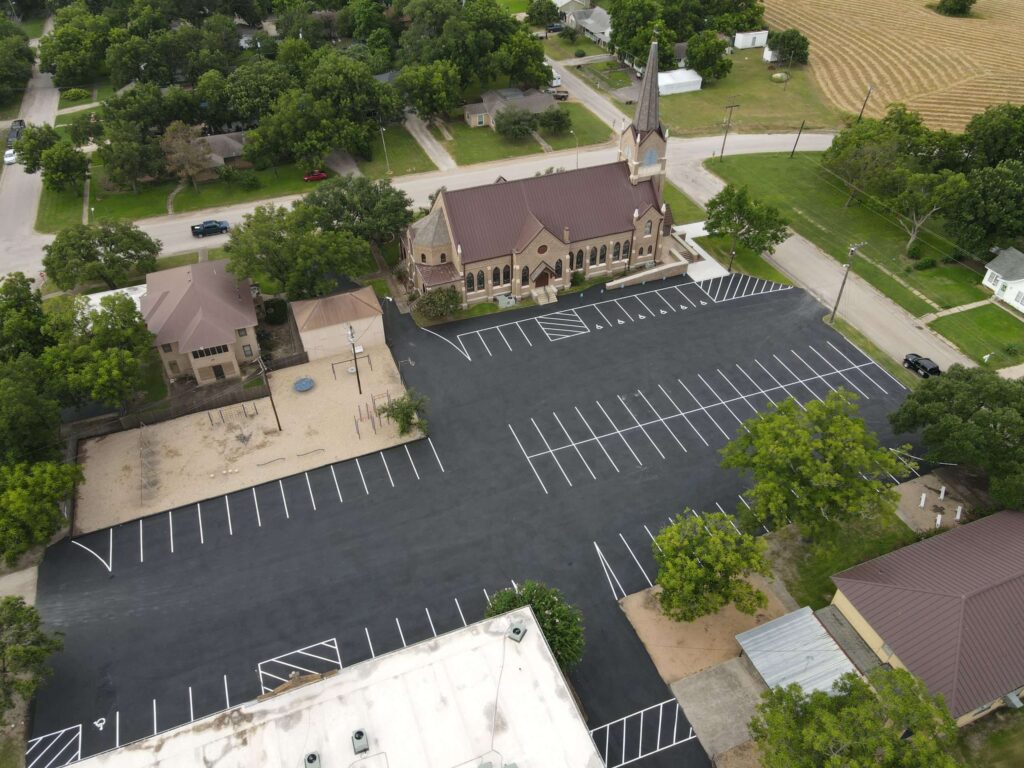Sealcoating is a vital, economical, and effective treatment for beautifying and protecting asphalt pavements. Asphalt sealcoating restores faded pavements to their original color, blocks damaging UV rays, and helps protect against automotive fluids. It also increases the pavement’s natural waterproofing properties, and it conceals minor surface imperfections. Before deciding how many coats to apply, your contractor will evaluate your pavement’s purpose, age, and condition.
Why Do Contractors Consider the Pavement’s Purpose for Determining How Many Coats of Asphalt Sealcoating to Apply?
Experienced sealcoating contractors understand the link between a pavement’s usage and the longevity of the sealant. Generally speaking, as the number, weight, and turnover of vehicles increases, the longevity of the sealcoating decreases. For example, a residential driveway for four cars that only move twice a day may only need a single coat. However, a parking lot for 2,000 vehicles that seldom remain longer than two hours will need at least two coats. An asphalt pavement at a logistics center may need three coats over the entire pavement. Passenger loading and unloading lanes, exits, entrances, and other high-traffic sections may need a third coat in those spots only.
What Is the Connection Between the Age of an Asphalt Pavement and the Number of Coats of Sealant?
The porosity of the asphalt can have a direct bearing on the number of coats your contractor needs to apply. For example, asphalt companies typically recommend waiting two or three months before sealcoating a new pavement. When the contractor applies sealcoating for the first time, the pavement may soak up too much of the sealant. This means that your asphalt maintenance contractor may need to apply an additional coat.
How Does the Pavement’s Condition Affect Asphalt Sealcoating?
At the other end of the spectrum, an extremely old pavement may also need an additional coat due to porosity. If the appearance of the pavement is really rough, an additional coat may help make it appear smoother. If the pavement has an excessive number of crack repairs, a second or third coat may make them slightly less noticeable. However, sealcoating will not obscure them.
How Often Should a Contractor Apply Sealcoating?
Sealcoating contractors consider similar factors when determining how many coats and how often to apply them. It is important to remember that sealcoating asphalt pavements too frequently can present as many problems as sealcoating too seldom. Therefore, the key is to determine the right schedule for each pavement. On average, residential driveways require fresh sealcoating about every three years. Sealcoating normally has a life of around two years for a typical parking lot. However, if the sealcoating starts to flake, peel, or crack, you should not wait until your scheduled time.
Trust RDC Paving for Assistance
RDC Paving serves customers throughout Central Texas, including those in Austin, Temple, San Marcos, and Round Rock. Our asphalt services include sealcoating, paving, repairs, asphalt milling, asphalt overlay, and crack repairs. We also offer parking lot striping, driveway paving, concrete work, and parking lot maintenance. We have an impeccable reputation for extraordinary craftsmanship, professional integrity, and exemplary service. You can fill out the online form to request a free quote, or you can call 512-920-9155 if you would rather discuss your project in detail.




